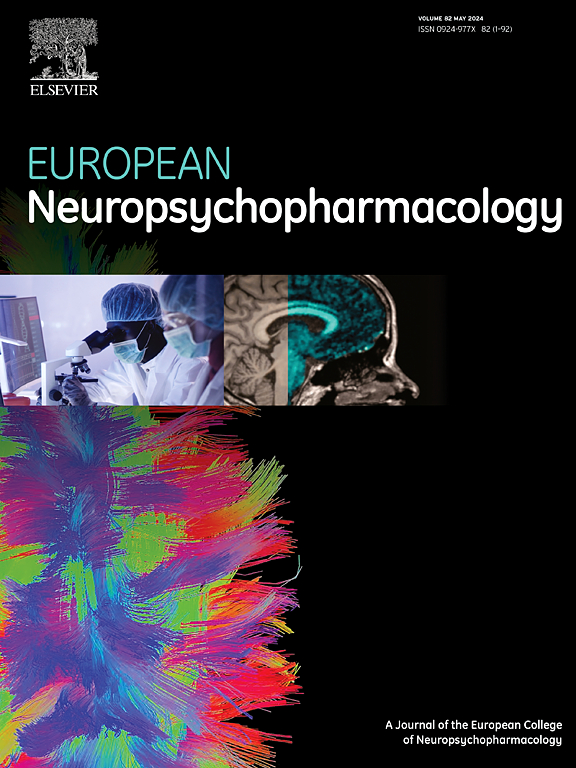FUNCTIONAL GENOMIC APPROACHES WITH SINGLE-CELL RESOLUTION PROVIDE MECHANISTIC AND BIOLOGICAL INSIGHTS BASED ON GENETIC ASSOCIATION STUDIES
IF 6.1
2区 医学
Q1 CLINICAL NEUROLOGY
引用次数: 0
Abstract
With few exceptions, the marked advances in knowledge about the genetic basis for psychiatric disorders have not converged on findings that can be confidently used for systematically interrogating underlying mechanisms for disease onset and progression. Functional genomics aims to provide mechanistic insights from genetic association studies and has the potential to facilitate biological insight. This series of presentations is from members of the newly started PGC working group for Functional Genomics and showcases how the use of data and methodology with single-cell resolution can further our understanding of the etiology of psychiatric disorders and the mechanism of drug action. The first talk describes an approach that allows the identification and characterization of cell type-specific and/or dynamic regulatory elements. The second talk leverages a new method to analyze cellular states and how these states relate to heritability enrichment for major depression disorder. The third talk describes a meta-analysis for optimizing sampling parameters for single-cell case/control studies which will provide much-needed rigor to an emerging field of study. The fourth talk is on the analysis of peripheral blood samples in the search for an immunological component to psychiatric disorders. Our four speakers all have expertise in single-cell methods and genetic association analysis. Each speaker has a complimentary background and methodological approach and will present the latest findings alongside the strengths and limitations of each approach and the datasets on which these analyses are based.
具有单细胞分辨率的功能基因组学方法,可在遗传关联研究的基础上提供机理和生物学见解
除少数例外情况外,有关精神疾病遗传基础的知识取得了显著进展,但这些进展并没有汇聚成可以有把握地用于系统探究疾病发病和发展内在机制的研究结果。功能基因组学旨在通过基因关联研究提供机理方面的见解,并有可能促进对生物学的深入了解。本系列报告由新成立的功能基因组学PGC工作组成员主讲,展示了利用单细胞分辨率的数据和方法如何进一步加深我们对精神疾病病因学和药物作用机制的理解。第一个讲座介绍了一种可以识别和表征细胞类型特异性和/或动态调控元件的方法。第二个讲座利用一种新方法来分析细胞状态以及这些状态与重度抑郁障碍遗传性富集的关系。第三个讲座介绍了优化单细胞病例/对照研究采样参数的荟萃分析,这将为这一新兴研究领域提供急需的严谨性。第四场讲座的主题是分析外周血样本,寻找精神疾病的免疫因素。我们的四位发言人都拥有单细胞方法和遗传关联分析方面的专业知识。每位发言人都有各自的背景和方法,他们将在介绍最新研究成果的同时,说明每种方法的优势和局限性,以及这些分析所依据的数据集。
本文章由计算机程序翻译,如有差异,请以英文原文为准。
求助全文
约1分钟内获得全文
求助全文
来源期刊

European Neuropsychopharmacology
医学-精神病学
CiteScore
10.30
自引率
5.40%
发文量
730
审稿时长
41 days
期刊介绍:
European Neuropsychopharmacology is the official publication of the European College of Neuropsychopharmacology (ECNP). In accordance with the mission of the College, the journal focuses on clinical and basic science contributions that advance our understanding of brain function and human behaviour and enable translation into improved treatments and enhanced public health impact in psychiatry. Recent years have been characterized by exciting advances in basic knowledge and available experimental techniques in neuroscience and genomics. However, clinical translation of these findings has not been as rapid. The journal aims to narrow this gap by promoting findings that are expected to have a major impact on both our understanding of the biological bases of mental disorders and the development and improvement of treatments, ideally paving the way for prevention and recovery.
 求助内容:
求助内容: 应助结果提醒方式:
应助结果提醒方式:


